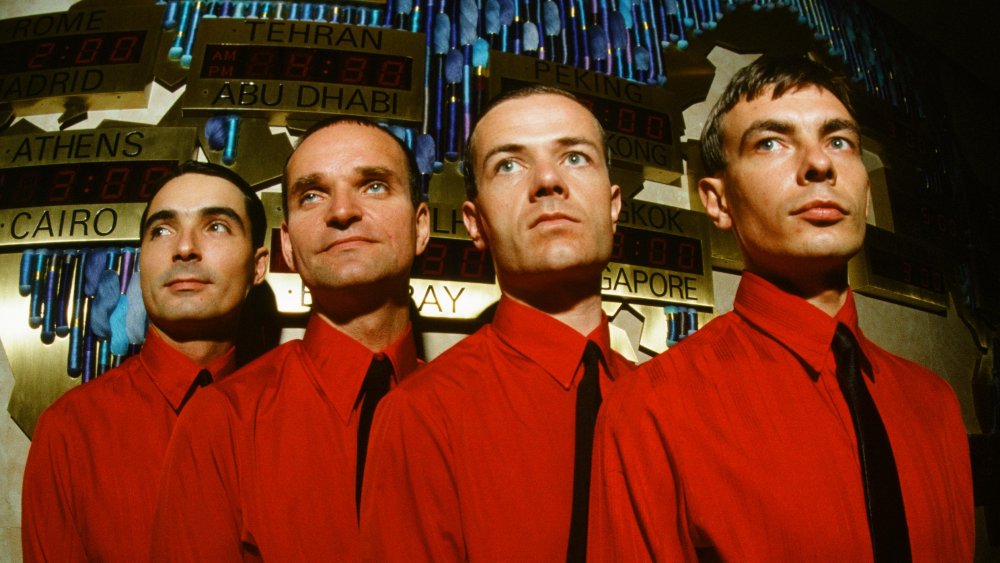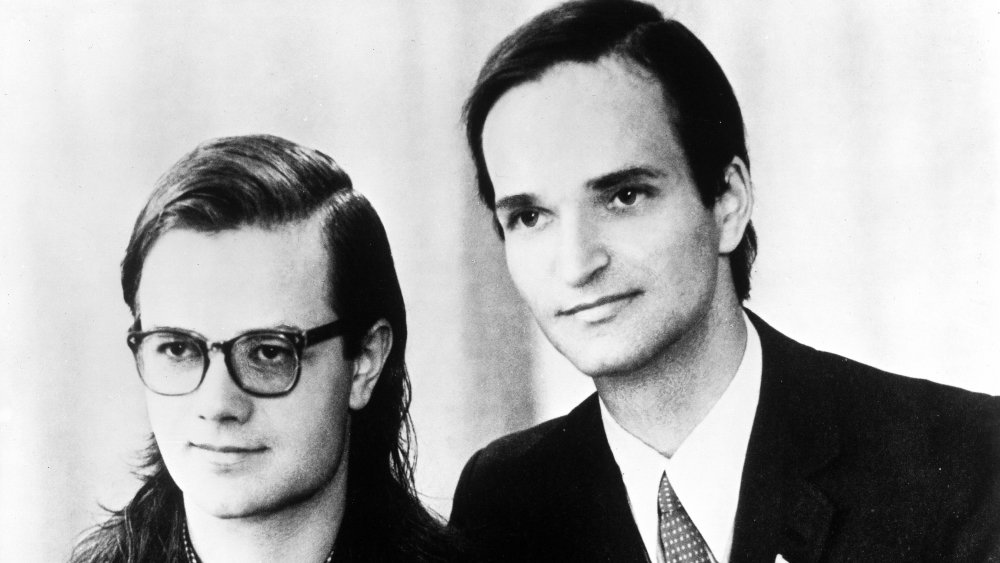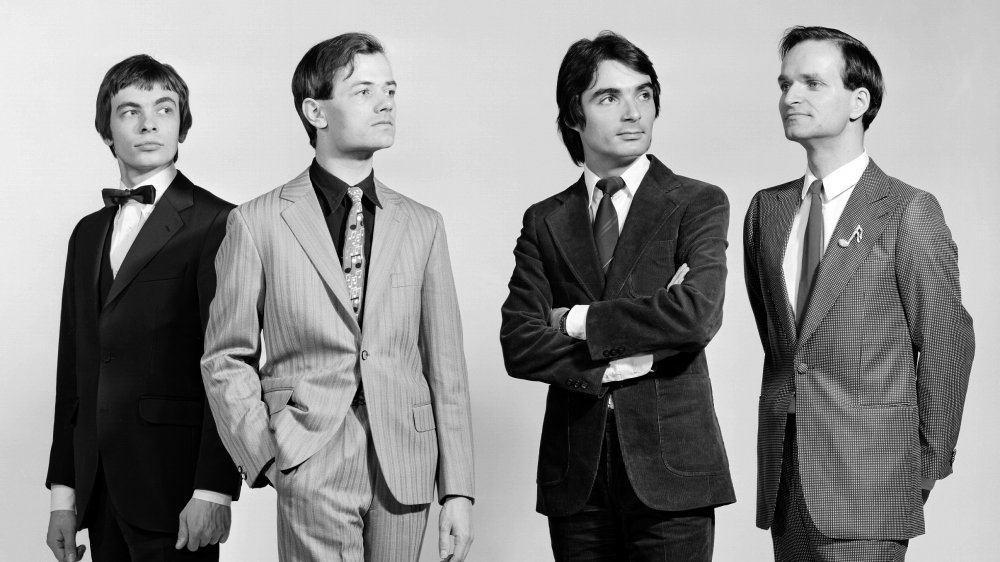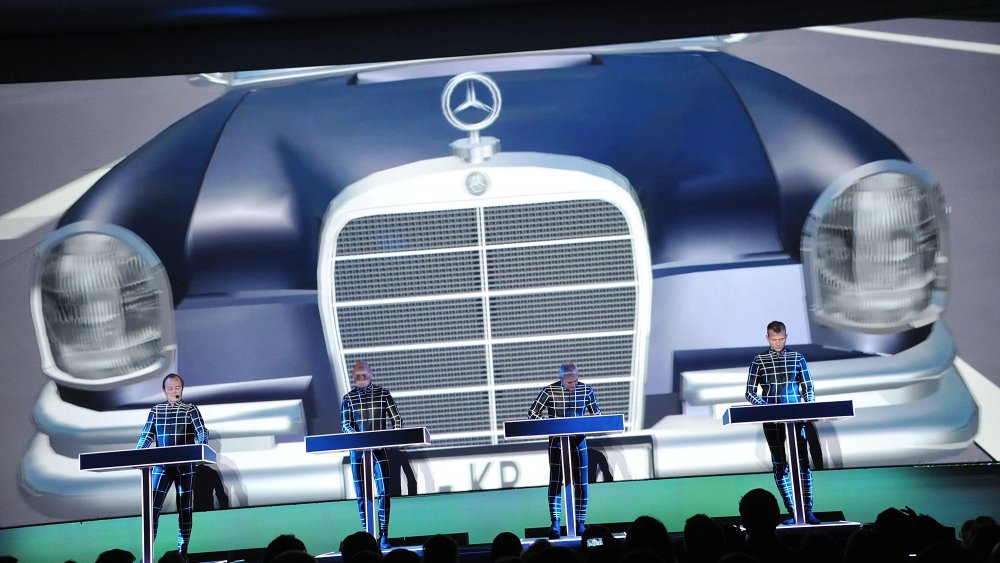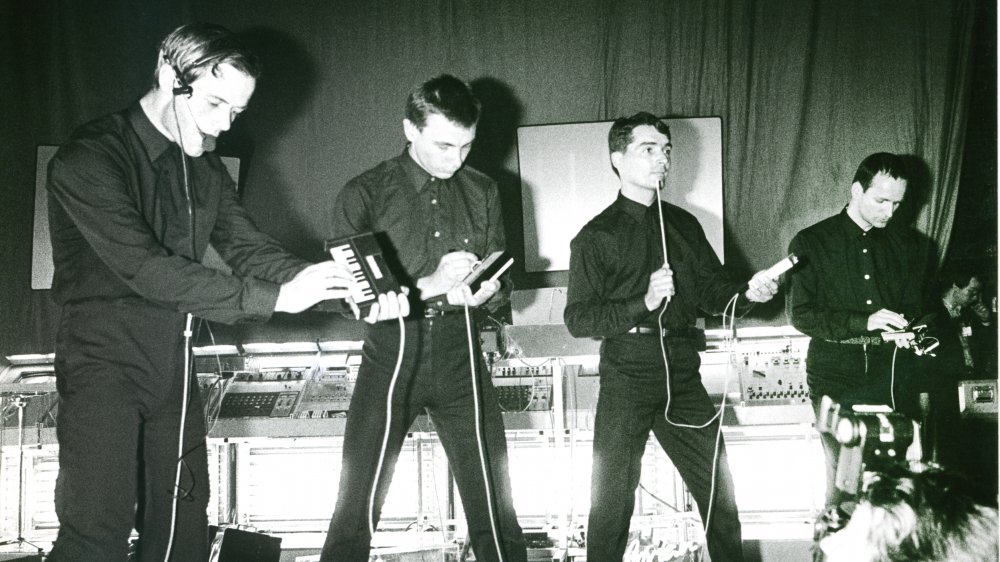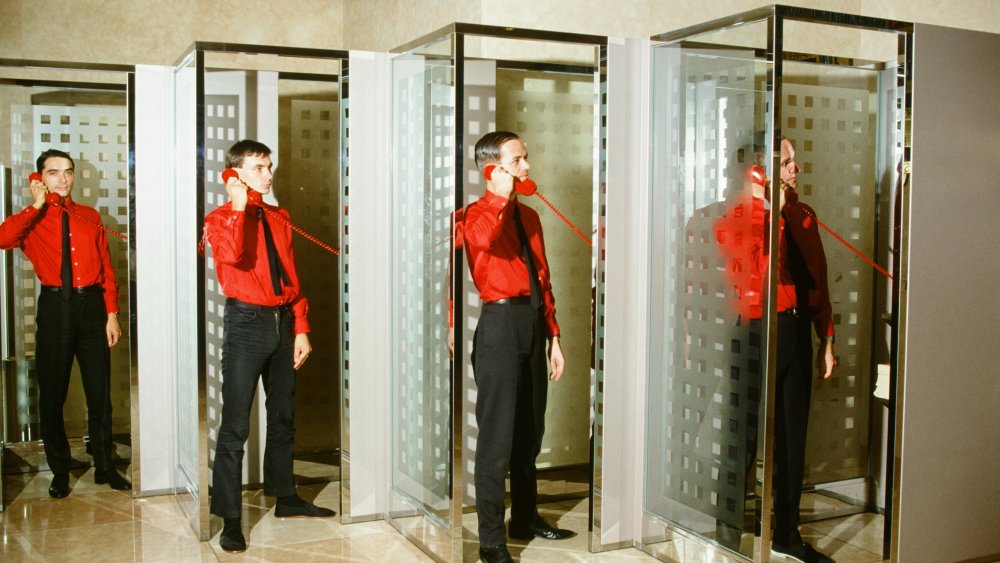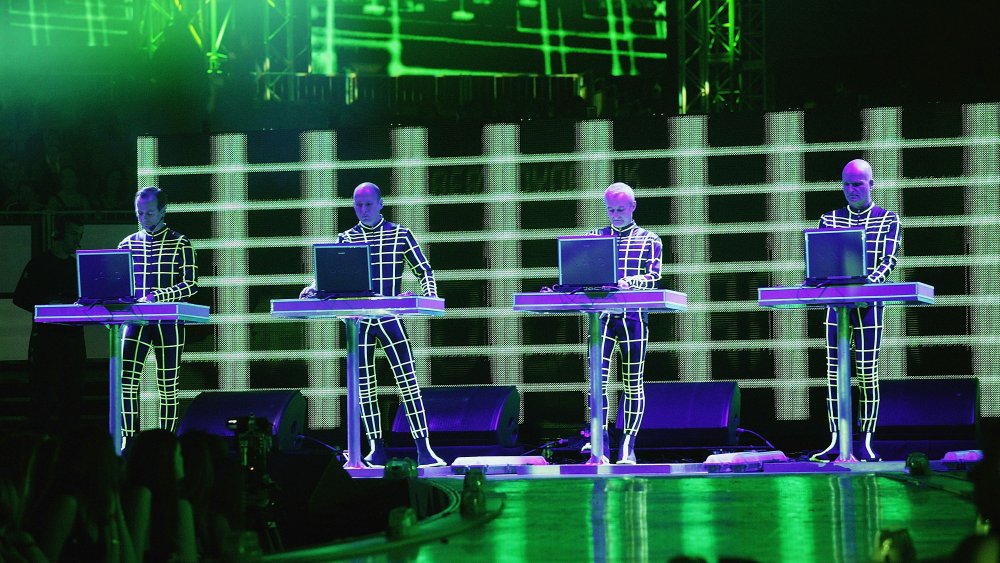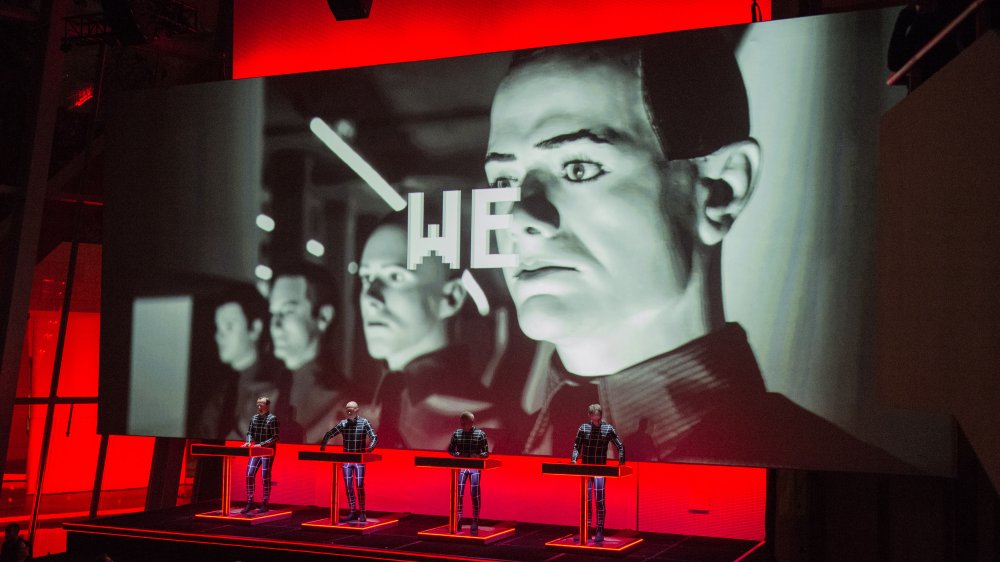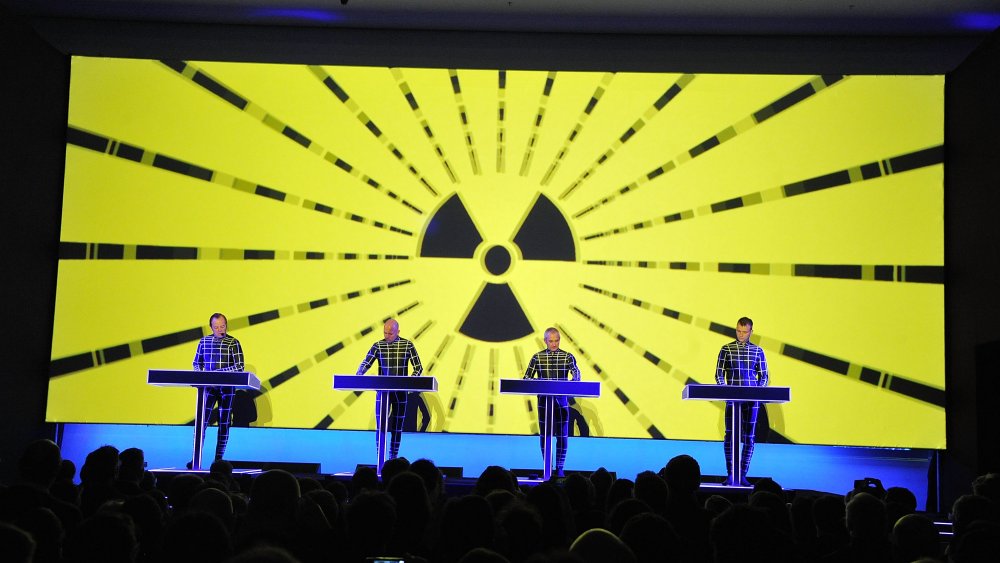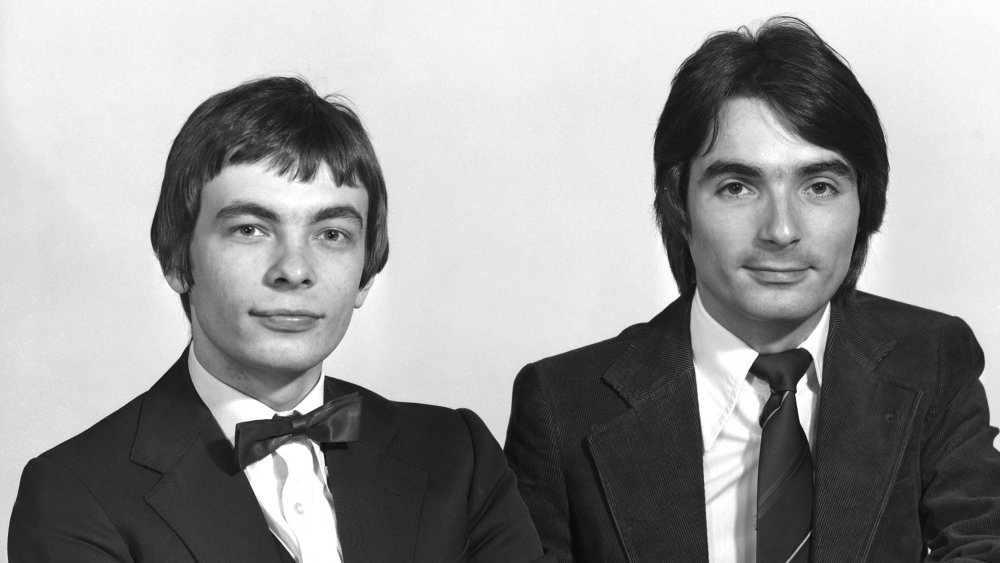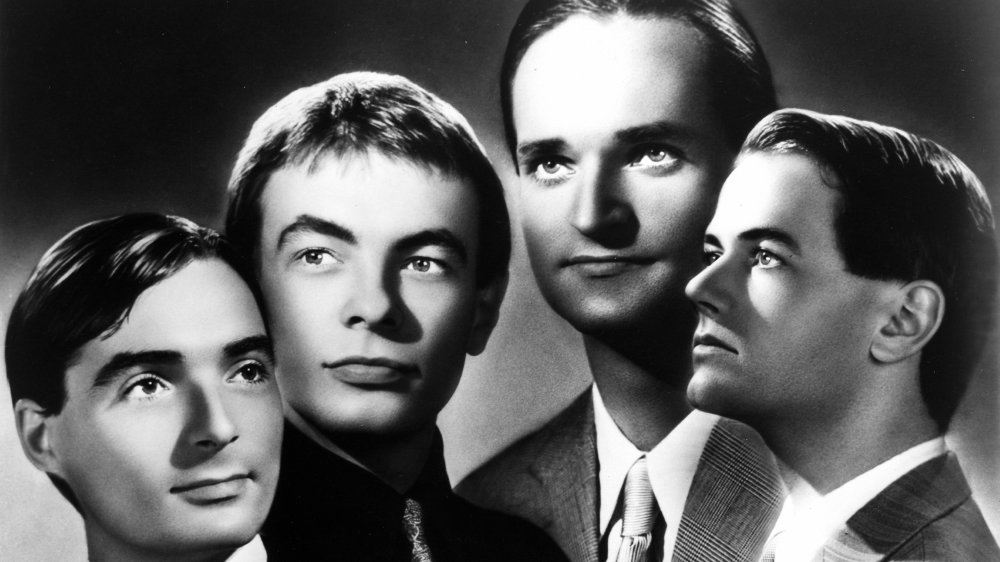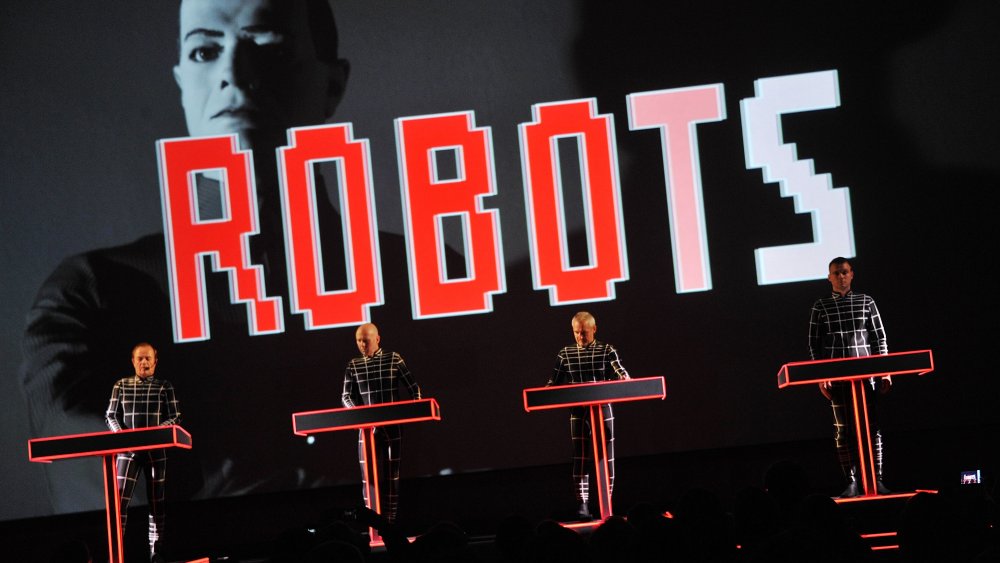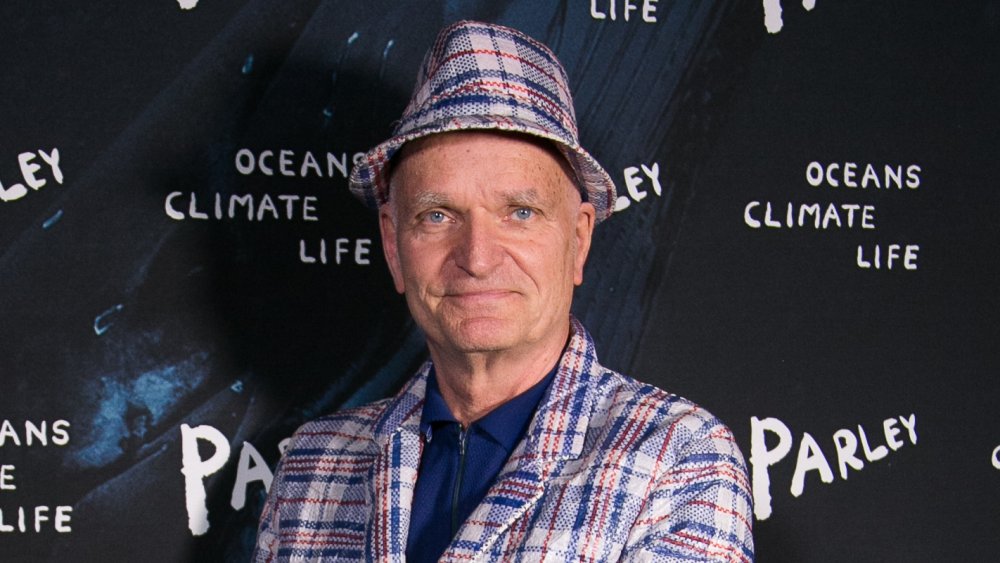The Untold Truth Of Kraftwerk
When Led Zeppelin and Pink Floyd were discovering all sorts of new noises from their guitars, Kraftwerk eschewed six-strings altogether in favor of something far stranger but at least as influential. Everything about the pioneering German electronic music group is the stuff of legend, from their groundbreaking music to their color-coordinated outfits, mesmerizing live performances, and mysterious, borderline reclusive personal lives.
Kraftwerk exploded onto the scene in the 1970s, and it was like the group had opened a time warp and played some strange, yet oddly catchy, robotic music from the far future. In a way, this was correct, because the Düsseldorf-based band indeed influenced the future directions pop music would take in a myriad of fashions. Whenever the group emerges from their mythical Kling Klang studio to unleash their latest audiovisual chemistry upon the unwary world, it's easy to believe that some of the world's most influential artists and producers are listening carefully and making notes.
But where did this peculiar band come from? What compelled its members to create such a strange yet instantly recognizable sound? Let's take a look at the untold truth of Kraftwerk.
Kraftwerk begins
Kraftwerk's robotic image is so strong that it's tempting to think that they didn't actually have a beginning but were carefully constructed in a laboratory, popping into existence fully formed with synths at hand. Of course, that's not quite the case. As Encyclopedia Britannica tells us, the late 1960s saw the band's co-founders Ralf Hütter and Florian Schneider as humble students of classical music at Düsseldorf Conservatory. Their first band was a five-man group called the Organization, and it was heavily influenced by the keyboard-based early electronica band, Tangerine Dream.
The band soon changed their name to Kraftwerk, and its lineup was basically Hütter, Schneider, and a string of outside collaborators. The group became a part of the "krautrock" movement, which The Guardian notes was a British joke name for the German experimental rock movement of the 1970s, also known as "kosmische musik" or "elektronische musik." The bands in this scene included influential cult favorites like Neu! and Can, and artists ranging from Q-Tip to Oasis would later draw inspiration from it.
Though The Guardian tells us that Hütter doesn't much care about the term "krautrock," Kraftwerk is still considered to be the most famous band to rise from the movement. However, they were only getting started...
Kraftwerk's "forbidden" early albums
Much like the Beatles spent some time as potty-mouthed, leather jacket-wearing bad boys before Brian Epstein forced them into their tailored suits and stylish mop-top haircuts, it took some time for Kraftwerk to find their famous look and sound. As The Guardian tells us, they actually made no less than three albums of "experimental art rock" before eventually landing on the electronic sound that made them famous. According to Matthew Horton of NME, Ralf Hütter doesn't hold Kraftwerk's three initial albums in particularly high regard and has actually quietly erased them from the band's "official" portfolio.
It's easy to shake your head at the notion of a band trying to downplay some of its early work, but if you get a chance to listen to the album trio, it's not exactly impossible to see where Hütter is coming from. While they're not exactly unworthy, they do seem pretty different from Kraftwerk's more famous fare. The band's debut album from 1970, Kraftwerk, is basically a band album that uses instruments like the flute and even features hints of free jazz. From the economically titled sophomore effort Kraftwerk 2 (1972) to Ralf Und Florian (1973), the band was basically just Hütter and Florian Schneider. While their sound was getting increasingly austere and electronic, you could still hear flutes, harpsicords, slide guitars, and influences from decidedly non-Kraftwerkian styles, such as folk and even glam pop.
The absurdity of "Autobahn"
Every famous band has a breakthrough hit, and true to their nature, Kraftwerk's first Top 40 song was considerably stranger than your average pop tune. As Encyclopedia Britannica tells us, the German group's first true international hit song was none other than "Autobahn," the titular song of their 1974 album of the same name. At over 22 minutes, the droning and repetitive, yet oddly mesmerizing, "Autobahn" is an ode to the road, specifically Germany's famous motorways of the same name.
Even though the BBC tells us that the single version was edited down to a much more manageable three minutes, a slow-paced "machinemusik" song depicting a long road trip was an unlikely success story. Still, while the audiences welcomed Kraftwerk with open ears (and, presumably, an expression of bemused surprise), the critics were less than happy. This was still the heyday of bands like Led Zeppelin, and the seemingly emotionally distant sound of "Autobahn" seemed alien to many. "They sound so detached," commented the NME at the time. "The kind of guys who could blow up the planet just to hear the noise it made." Amusingly, this sort of sounds like they were complaining that Kraftwerk was too dangerous and rock 'n' roll for them to handle.
Strange ways to make robot pop
Kraftwerk makes strange music, and for that, they've always been open to some pretty strange instruments. As the BBC tells us, band founders Florian Schneider and Ralf Hütter have described themselves as "klangchemiker" (sound chemists) and have willingly jumped at the chance to explore all sorts of new technology. When available technology hasn't been enough, they've been more than happy to experiment with their own inventions and customizations. Schneider personally developed at least two instruments: a synthetizer called the Robovox and an electronic flute. While Schneider left the band in 2008, The Guardian notes that Hütter still considers Kraftwerk's famed Kling Klang studio his "electronic garden."
In 2017, Fact Mag took a look at some of Kraftwerk's strange musical equipment, noting that the technological pioneers have often built, customized, and commissioned their gear. Custom-made electric drum pads, laser drum cages, special sequencers, and obscure synths were the name of their game in the 1970s, and they haven't exactly become less innovative with time. In 1993, they collaborated with synthetizer innovator Dieter Doephfer to create a version of the kind of gesture control that would be later popularized by the Nintendo Wii and similar gaming consoles. Interestingly, the device they used was a customized Nintendo Power Glove they called the MOGLI.
Bigger than the Beatles?
When people discuss the most influential band of all time, the most common answer is probably the Beatles. However, many experts consider Kraftwerk to be up there with the Fab Four. As Mark Savage of the BBC tells us, the Düsseldorf magicians' unique soundscape became "the sonic template for everything from hip-hop to dance music." Yep, their carefully honed electronic sound has shaped and influenced decades of popular music.
Simon Reynolds of NPR opines that Kraftwerk's musical influence is actually more important than that of the Beatles, as the Germans operated on an incredibly wide scale. Kraftwerk's work has impacted an impossibly wide array of genres, ranging from progressive rock and post-punk to industrial music, techno, and even disco. As such, artists from Daft Punk to Prince are indebted to Kraftwerk in one way or another. In 2013, Jude Rodgers of The Guardian went as far as to say that Kraftwerk was still the most influential group in the world. He also mentioned that apart from broad musical influences, a number of artists have also borrowed from them more directly: Kraftwerk's work has been sampled by literally hundreds of musicians, including superstars like Madonna, Missy Elliott, Coldplay, and Jay-Z. Oh, and even their carefully constructed image has been known to influence certain little-known artists, such as Kanye West and David Bowie.
The difficulty of a Kraftwerk concert
Kraftwerk live shows are innovative audiovisual experiences, to the point that Tim Jonze of The Guardian calls them just about as perfect as live music can get in several ways. However, the price of standing at the forefront of innovation is high, and the group has historically struggled with bringing their vision onstage. The band has always been attentive to the visual aspects of their concerts, but their desire to create a "Gesamtkunstwerk" (a German concept of a complete work of art) has been hindered by the simple fact that the available technology has not been up to scratch.
Early on, Kraftwerk's shows had to rely on what Ralf Hütter calls "too much compromise," with studio musicians and tapes helping to bring their music to live audiences. During the 1980s, the band basically had to pack up their entire Kling Klang studio and take it with them whenever they gave a concert. In recent years, the group has been able to create brilliant visuals that match their music, providing the audience with 3-D glasses that allow for an incredibly immersive experience. However, Hütter notes that the progress of technology has not always been speedy and compares the development of their ideas to growing plants. "Sometimes it has gone slow," he said in 2017. "But there's always a next step or development. It's a continuous process, more like gardening. There are certain plants that you work on, and others that grow [themselves]."
Kraftwerk's Detroit connection
Kraftwerk may seem like a thoroughly German band, but they've always shared a link with Detroit, of all places. While the connection may seem strange at first, The Guardian notes that it actually makes perfect sense. When Florian Schneider and Ralf Hütter founded Kraftwerk in 1970, they drew inspiration from many places, including influential Detroit bands like MC5 and the Stooges. Karl Bartos, a member of Kraftwerk's "classic" lineup, has also drawn a parallel between them and Detroit's Motown label's heavily industrialized production line. When Kraftwerk started making waves, Detroit was in the middle of an economic crash, and the German group's technology-heavy, futuristic music provided the Motor City a much-needed science fiction respite. As such, Detroit's most prominent DJ, Charles "Electrifyin' Mojo" Johnson, played Kraftwerk tunes on a regular basis. As a result ... well, as Mix Mag notes, Detroit is the birthplace of techno.
In a 2015 interview with Rolling Stone, Hütter acknowledged the band's connection with Detroit and said that they're good friends with Juan Atkins and Derrick May, prominent figures in the city's techno scene. He also noted that Detroit provided Kraftwerk with some welcome Stateside attention. "Our music wasn't always played on radio; it was not so popular, apart from Autobahn in the 1970s," the Kraftwerk man reminisces. "In the late 1970s, it started again in Detroit. So there's this spiritual connection. We feel very strongly the energy and always have tried to come back and perform there."
Kraftwerk's release schedule is less than hectic
As The Guardian tells us, Kraftwerk is notoriously slow to release new music. In fact, as of 2020, the band's most recent studio album remains 2003's Tour de France Soundtracks, and the one before that was Electric Cafe from ... 1986. What's more, Ralf Hütter's default answer to the question of a new studio album has historically been: "When it's finished."
However, that's not to say that the band aren't actively working on new music. According to Hütter, as of 2017, they were still keeping office hours at their Kling Klang studio whenever they weren't touring. Their method of musical experimentation and evolution just happens to be rather slow, since they micromanage their sound quite a bit and often return to existing bits of music to tinker with them when some new technological development provides the opportunity for an upgrade. With that in mind, it's worth noting that their discography becomes quite a bit more robust when you count the remixes, remasters, and live albums they've released between 1991 and 2017.
Those other two guys
Kraftwerk buzz often focuses on the band's founders, Florian Schneider and Ralf Hütter. However, the group has traditionally been a quartet, and the current lineup of Hütter, Fritz Hilpert, Henning Schmitz, and Falk Grieffenhagen is far from the only one. Arguably, the most legendary version of Kraftwerk consisted of Schneider, Hütter, Wolfgang Flür, and Karl Bartos. As The Guardian tells us, the quartet started working together on the Autobahn tour of 1975, and Flür and Bartos remained with the band throughout their legendary 1970s and 1980s run that wrapped up with 1986's Electric Cafe.
According to Bartos' website, he left for less robotic pastures after 1991's The Mix remix album and started a solo project called Electric Music in 1992. Since then, he's released plenty of music, art projects, and soundtracks. He's done a stint as a visiting professor at the Berlin University of Arts and occasionally worked with other artists, such as New Order's Bernard Sumner and former Smiths guitarist Johnny Marr. As of 2013, he was quite happy about his Kraftwerk legacy and remained on great terms with Flür.
Meanwhile, Flür likes collecting Kraftwerk memorabilia, but his relationship with the band is a little more difficult, perhaps because of the lawsuit over his tell-all autobiography from 2000, I Was A Robot. According to The Irish Times, he left the group in 1987. After leaving, he has been known to do some DJ work and the occasional collaboration.
Kraftwerk and cycling
Kraftwerk is far from a typical rock band, and their favorite pastimes are far from the superstar excesses of, say, Mötley Crüe. According to NPR, journalist Lester Bangs asked Florian Schneider in 1975 about Kraftwerk's groupie situation, and Schneider's immediate reply was: "None. There is no such thing." Instead, Schneider and Ralf Hütter have poured a considerable amount of passion in long-distance cycling. They have bought tons of bicycles and occasionally even raced between cities when they were touring. The hobby has also bled into their music with the 1983 single "Tour de France" and the 2003 album Tour de France Soundtracks.
Though Schneider left the band in 2008, and Hütter has said they more or less lost connection after that, The Guardian notes that the remaining Kraftwerk founder hardly has to ride alone. It appears that the members of the current Kraftwerk lineup are all cyclists as well, and as of 2017, they were still taking weekend cycling trips together. While Hütter says you don't have to be a cycling enthusiast to join Kraftwerk, he claims that it helps with the forward-thinking mindset their music requires. "You can only go in one direction — always forward," he describes his beloved hobby. "Also, it's about being independent. You use your own forces to go forward."
Incidentally, none of the band members have ever actually participated in the Tour de France race. "We are too slow," Hütter says.
Kraftwerk isn't really a music group
Though Kraftwerk is doubtlessly an innovator of music, the band is actually about a lot more than just audio. As anyone who has seen Kraftwerk perform can attest, they're heavily invested in the visual side of things, and The Guardian notes that creating a "complete work of art" is the group's longtime dream.
In a 2015 interview with Rolling Stone, Ralf Hütter noted that the band is closely related to the art scene of Düsseldorf and has always been heavily involved in it. In fact, he said that he doesn't really think of Kraftwerk as a strictly musical group at all. "Kraftwerk is really a multimedia concept," he stated. "Not just music." As such, their small team of technicians, programmers, and musicians often tinkers with things that aren't strictly related to making new songs. For instance, in 2015, they were busy working on 3-D: The Catalogue, an elaborate live album experience that turned every single song on their eight "official" albums into a 3-D audiovisual format, and the Blu-ray box set version also included a 228-page book.
Florian Schneider's death
As The Guardian tells us, April 21, 2020, was a sad day for electronic music. This was the day Kraftwerk co-founder, Florian Schneider, died of cancer at age 73. Reportedly, the musical pioneer had been gone from Kraftwerk for quite a while at that point. He was never a fan of playing live and performed his last show with the group in 2006. It's thought that he left the band in late 2008, and in 2015, Ralf Hütter told Rolling Stone that Schneider had not been involved with the band's music for a long time, preferring to concentrate on speech synthesis research and "things like that."
Things like that included, surprisingly enough, new music. In 2015, Schneider unexpectedly joined forces with Dan Lacksman of the Belgian group Telex to release a new song called "Stop Plastic Pollution" for an organization called Parley for the Oceans. In a 2015 interview with Electronic Sound, Lacksman revealed that the track had been recorded over a year earlier and that Schneider came up with the inspired idea to build the track around sampled sounds of real water drops. Lacksman also mentioned that they were working on several other tracks and that Schneider's wish was to do something that didn't sound like Kraftwerk. It remains to be seen what, if anything, became of these tracks. Still, even if we never get to hear them, there's no denying that Schneider was a true legend of music.
